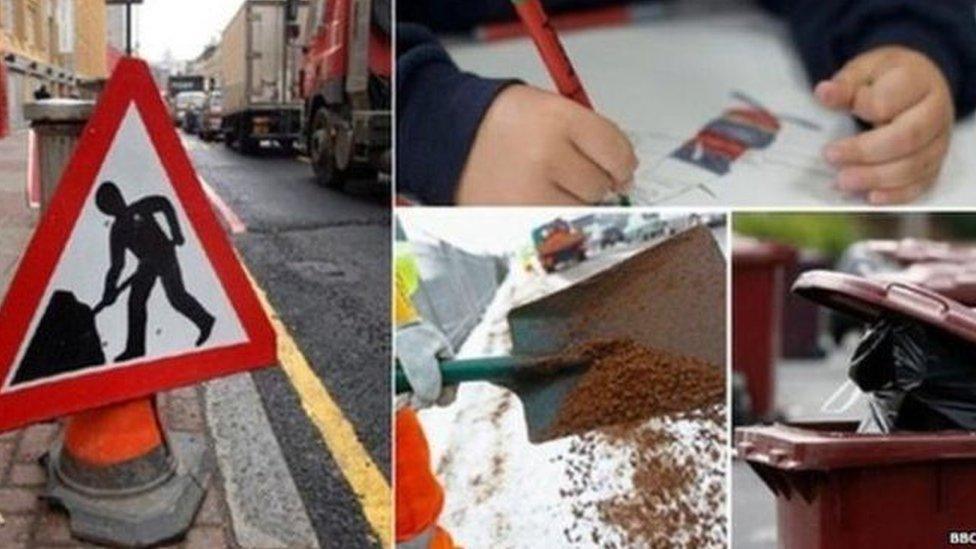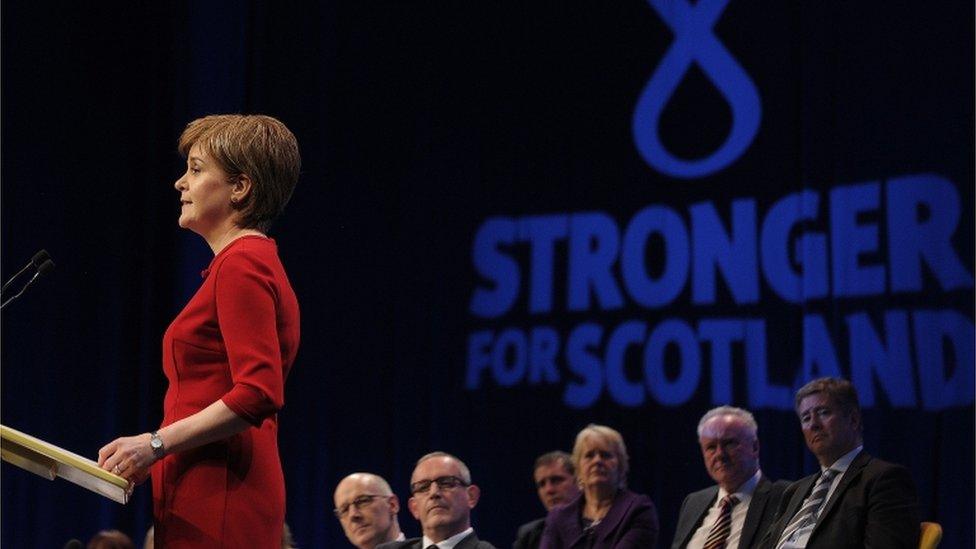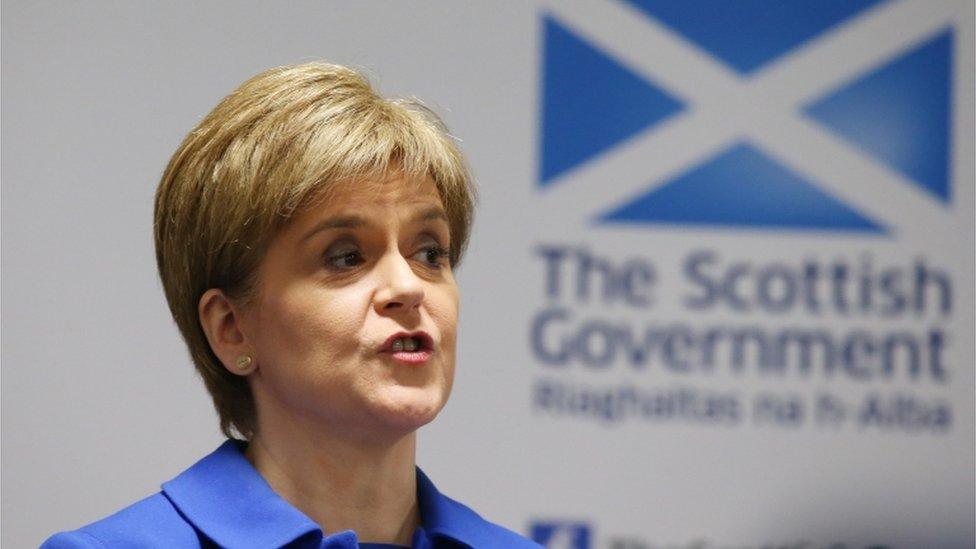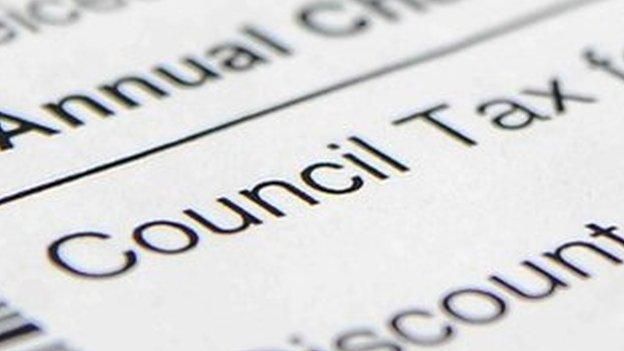The SNP's long, slow retreat from local income tax
- Published

Perhaps they could compose a pipe tune. "The SNP's Retreat from Local Income Tax." Maybe they could play it at the Tattoo.
In truth, it has been a long, slow retreat. In 2007, the SNP manifesto was explicit. The "unfair" council tax would be scrapped, with a local income tax set at 3p.
By 2011, the approach was more nuanced. The SNP promised to "consult with others to produce a fairer system based on ability to pay to replace the council tax and we will put this to the people at the next election, by which time Scotland will have more powers over income tax".
Opponents, naturally, seize upon that word "replace" in describing today's announcement as a broken promise.
By no stretch, they argue, can Nicola Sturgeon's plan be said to "replace" council tax. Supporters of the SNP say the reforms will be "a fairer system based on ability to pay".
Politically, ministers reckon they can put up with invective from their party opponents - even sustained invective - as long as the reforms are seen by voters, in general, as broadly fair. Universal support is not feasible in this troubled world.
Progressive or timid?
What stays? The council tax. Eight bands, A to H.
What changes? An increase in the top four bands, raising £100m for schools, with exemptions for low-income households, including pensioners. Enhanced support for the low-paid across all bands. An end to the nine-year freeze from next year, followed by a cap of 3% on the annual increase in council tax. Allowing councils to scrap the second home discount. Eventually, an assigned share of income tax.
Ministers say the deal is fair and progressive. Opponents on the left, Labour, Lib Dem and Green, say it's timid and insulting, by contrast with the earlier zeal for radical reform. Opponents on the right, the Conservatives, are more supportive but still fretting over the signal sent about higher taxation in Scotland.

Councils could be given a share of income tax in future
The voters will choose. But perhaps we might look at some underlying issues. Firstly, why did the SNP retreat from local income tax?
They looked closely, in government - and they did not like what they saw. Firstly, particularly at a time of recession, it became apparent that income tax was not sufficiently buoyant to bear the weight of funding local authorities directly, as well as indirectly.
Secondly, it became steadily evident that it would be difficult to allow local discretion over the level of income tax. In practice, ministers concluded, it would have to be a nationally set tax, distributed locally. Thus eroding one key aim, council accountability.
Intriguingly, the Scottish Liberal Democrats - who have cherished local income tax for aeons - have now dumped the concept too and will look at a form of property taxation.
Innate caution
Why have the SNP not gone for more radical reform? Firstly, history. The last radical reform of local revenue resulted in the Community Charge or Poll Tax, lamented by a few, loathed by most.
Secondly, innate caution as evinced by Nicola Sturgeon and John Swinney.
Robert Burns regarded it as given that "highlandmen hate tolls and taxes". Similarly, contemporary voters are generally suspicious of taxes levied upon their own family, whatever they might occasionally tell pollsters.
Ms Sturgeon and Mr Swinney recall that, just shy of a decade ago, the council tax was particularly hated. There were strident demands for its abolition.
That vituperation has lessened. Why? Because we are about to enter the ninth year of a freeze in charges. Lower the cost, lower the loathing.
Having placated the people, relatively speaking, Ms Sturgeon and Mr Swinney do not want to stir up hostility again. They reckon a modest plan - with relatively moderate increases in the upper bands, plus relief for the lower paid - will just about cut it in public opinion.

Nicola Sturgeon may well have some words on local taxes in her SNP conference speech next weekend
Another issue. How can ministers guarantee that the £100m raised from Bands E to H will be spent on schools? Right now, frankly, they can't. But they believe they will be able to make the promise stick.
It's expected that Ms Sturgeon may have more to say on this subject in her party conference speech at the end of next week. But negotiations will begin with local authorities.
As with the nine-year freeze, there would remain the option of sanctions. Ministers could, for example, threaten to withdraw £100m in central grant - unless the £100m raised in extra council tax cash goes to schools.
But, to emphasise, ministers do not want to do that. They believe they can strike a deal - despite the initially withering response from COsla to today's package.
Finally, we have yet to hear in detail from the other parties as to their own plans. They will each do so in the run up to the May election. For example, Labour say their scheme will emerge in the next couple of weeks.
It is likely to involve a reformed property tax - but, say insiders, more radical than the SNP offer.
PS: Next in the conference circuit is the Conservative gig on Friday this week. I would very much welcome questions for my webcast interview with Ruth Davidson. Please send them in asap. Serious and thoughtful would be grand.
- Published2 March 2016

- Published14 December 2015
